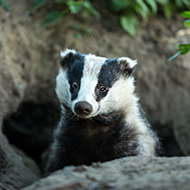
Animal welfare groups issue warning over local extintion events.
Animal welfare groups are calling on Natural England to suspend an upcoming badger cull in light of the impact of extreme weather on badger populations.
Vet and head of policy at Born Free, Dr Mark Jones, and Badger Trust executive director, Peter Hambly, are among the six signatories of an open letter warning of the possibility of local extinction events.
It follows a long stretch of hot and dry weather, which has triggered drought in parts of southern, central and eastern England. Campaigners fear that, as the ground dries out, badgers will not be able to access their favoured prey source, earthworms, or get easy access to water.
The letter reads: “We are collectively asking for an immediate suspension of the upcoming cull in intensive zones in light of the impact that extreme weather is having on badgers and their cubs.
“Population levels have fallen, and badger clans are in severe distress. Going ahead with an intensive cull under these conditions increases the possibility of local extinction events in areas badgers have thrived for 500,000 years”.
According to the Badger Trust, the areas most at risk of extinction events are Gloucestershire, Somerset, Cornwall, Devon and Dorset.
Mr Hambly said: “The national wildlife tragedy that is the English Badger Cull needs to stop. The thought of the local extinction of badgers in areas they have thrived for thousands of years is horrific. This severe weather and drought conditions have made the situation desperate in many areas, to continue with the intensive cull in these conditions is inhumane.”
This summer marks the beginning of the tenth season of badger culls to reduce TB in cattle, despite a study that found culling has had no significant impact on bTB among cattle herds. The finding triggered an argument over the study's methodology, which the government said was 'scientifically flawed'.
More than 176,000 badgers have been killed under license since culling began in 2013.
The other signatories of the letter are Four Paws UK, the International Fund for Animal Welfare, League Against Cruel Sports, and the RSPCA.”



 The Veterinary Medicines Directorate (VMD) is inviting applications from veterinary students to attend a one-week extramural studies (EMS) placement in July 2026.
The Veterinary Medicines Directorate (VMD) is inviting applications from veterinary students to attend a one-week extramural studies (EMS) placement in July 2026.